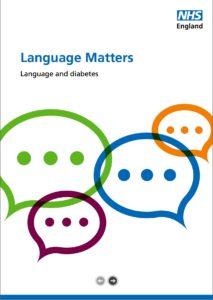 New guidelines aimed at healthcare professionals tackle how language is used – and sometimes misused – when talking about diabetes, because language matters. By Sue Marshall, editor, Desang Diabetes Magazine.
New guidelines aimed at healthcare professionals tackle how language is used – and sometimes misused – when talking about diabetes, because language matters. By Sue Marshall, editor, Desang Diabetes Magazine.
Most healthcare professionals (HCPs) are professional and polite when dealing with their patients; some might even refer to us as clients. However, patients and HCPs use different language and terminology to refer to the condition, and it’s here that problems can occur. Most of us use the term ‘living with diabetes,’ as opposed to ‘suffering from diabetes’, and use the phrase ‘people with diabetes’ instead of just the simpler ‘diabetics’. Sometimes ‘people with diabetes’ gets shortened to PWDs, but that seems rather a remote and unfriendly term
I’ve been living with T1D (there you go, another way to refer to diabetes) for so long I pretty much don’t care what you call it. I was cautioned recently by a doctor who told me, in my best interests, that ‘we never use the world diabetic – always people with diabetes,’ when he checked an article I had written for this magazine. He meant well, but I’m stuck in my ways and see nothing wrong with being called, or calling myself, a diabetic.
I was recently quoted in an article by Sarah Stacey about glucose sensors for The Mail On Sunday’s YOU Magazine. However, the article garnered some feedback about the language used, with one reader getting in contact with that magazine to say, “I am an avid YOU magazine reader and particularly enjoy your articles. However, I was somewhat dismayed that you referred to people with diabetes as diabetics. Would someone be called ‘cancer’ if they were diagnosed with it? Likewise, do we become ‘headache’ or ‘flu’ if suffering with one? It is very offensive to refer to people as the condition/disease/ailment they are suffering from. This term is outdated and hurtful. People have things and definitely don’t become them. It is damaging to self-esteem. Please don’t label people with diabetes as diabetics. This is written by someone who has had diabetes since seven years old and am still living well with it 35 years later.”
This was certainly an impassioned request, but I had to point out that having been diagnosed with Type 1 diabetes at age the age five, more than 45 years ago, it just goes to show that we’re all different – and all entitled to our opinions – as I am perfectly OK with being referred to as ‘diabetic’.
On starting the online Desang Diabetes Magazine six years ago I asked the existing readership what terms they thought were OK to use when referring to diabetes and the vast majority referred to themselves as ‘diabetic’. But this campaign has not really just about that, but about how people with diabetes feel after they have been to an appointment with their healthcare team, and how improved language could lead to improved outcomes in the long term.
Type 1 diabetic Chris Aldred, who uses Twitter under the name #grumpy_pumper, has spoken about the recent #languagematters campaign which was reported by JDRF. He says, “I am very happy with my current consultant. I like that when I enter the appointment room she asks how I am rather than launching into a conversation about my numbers – I feel she sees me as a person before the diabetes. She asks me what I want to talk about and I am able to lead the conversation. I always leave feeling positive and motivated.”
Picking up on the fact that the language used can often seem critical, Aldred asks HCPS to consider, “When someone is more open about what is happening in their life, you can get a better impression of what activities or events might be impacting their blood glucose. It’s a win-win situation. Even when you think that someone’s management can be improved, please stay positive. Criticism and negativity rarely leaves a person feeling motivated to change.”
Another person with Type 1 diabetes is Sarah Gatward who explains how language can make a difference in a clinical environment, remembering a particularly useful visit to to her local GPs, “Although I am now back under routine hospital appointments, I tend to see the team at my GP surgery either once or twice a year for bloods, medication review, flu vaccination etc. It is always the same team, which is lovely, as you feel they know you and you don’t have to start back at square one explaining your history at each visit. As I sat down at one particular appointment, the first question the practice nurse asked me was “how are you?” Diabetic clinic appointments will always be different to appointments you make to see an HCP when you are unwell, as they know why you are there and will often open the consultation by pulling up your latest HbA1c result and using that as a conversation starter. But she asked me how I was!
“We moved onto bloods eventually and she made some comment about recognising that I always seem to have everything well managed but she wanted to make sure that I was okay…. as a person… in my life…. It may not seem a big deal but it was; not because I particularly felt that I needed to talk about any issues, but that she was asking about the whole of me. The door was open for me to talk about what I felt was important – a subtle but very important difference. It still makes me smile today when I think about it.”
However, not all of Gatward’s experiences with language have been good ones. To read her full story, see further reading below.
Right now I reckon my favourite reference is ‘Type-oner’. Please be assured that no offense is ever intended by the use of the word diabetic, it’s used as well as other phrases in order to keep the way we do refer to our condition open and varied without causing too much confusion about what can be a complicated condition.
To download the Language Matters Guide for Healthcare Professionals, click HERE.
News items and features like this appear in the Desang Diabetes Magazine, our free-to-receive digital journal (see below). We cover diabetes news, diabetes management equipment (diabetes ‘kit’ such as insulin pumps and continuous glucose monitoring equipment) and news about food suitable for a diabetic diet including a regular Making Carbs Count column. We just need your email address to subscribe you (it’s free, and you can easily unsubscribe should you wish to).




